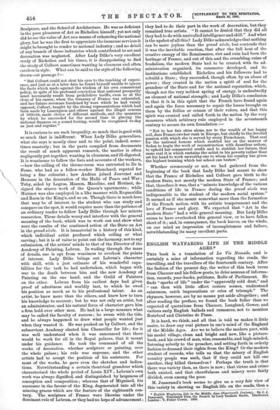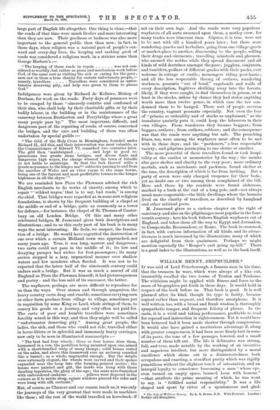ENGLISH WAYFARING LIFE IN THE MIDDLE AGES.*
Tars book is a translation of La Vie Namade, and is certainly a mine of information regarding the roads, the travelling, and the travellers of the fourteenth century. After the fashion of the present day, the writer of this book turns from Chaucer and his fellow-poets, to drier sources of informa- tion, records, year-books, petitions, Rolls of Parliament. He finds " sparks of life " under the " apparently cold dust," and " can then with little effort restore scenes, understand existences, catch imprecations or cries of triumph." The rhymers, however, are by no means put aside altogether; and after reading the preface, we found the book fuller than we expected of quotations from Chaucer, Langland, Gower, and various early English ballads and romances, not to mention Rutebeuf and Christine de Pisan.
It is hard, we think, and all that is told -us makes it little easier, to draw any real picture in one's mind of the England of the Middle Ages. Are we to believe the modern poet, with his model village, clean and bright and new, like a picture- book, and his crowd of men, wise, reasonable, and high-minded, listening soberly to the preacher, and setting forth in orderly fashion to demand their rights from the King P Or the modern student of records, who tells us that the misery of English country people was such, that if they could not kill one another, they killed themselves ? Perhaps the truth is that there was variety then, as there is now ; that virtue and crime both existed, and that cheerfulness and misery were fairly divided, even among the poor.
M. Jusserand's book seems to give us a very fair view of this variety in showing us English life on the roads, then a
English Wayfaring Life in the Middle Ages (Fourteenth Century). By J. J. Jusserand. Translated from the French by Lucy Toulmin Smith. Illustrated. London : T. Fisher Unwin. 1865.
large part of English life altogether. One thing is clear,—that the roads of that time were much livelier and more interesting than they are now. Their goodness or badness was also more important to the general public then than now ; in fact, in those days, when religion was a natural part of people's out- ward and every-day lives, the keeping and making good of roads was considered a religious work, in a stricter sense than George Herbert's :—
" The keeping of these roads in repair was not con- sidered as worldly, but rather as pious and meritorious work before God, of the same sort as visiting the sick or caring for the poor ; men saw in them a true charity for certain unfortunate people,—
namely, travellers Travellers were considered as unfor- tunates deserving pity, and help was given to them to please „
Indulgences were given by Richard de Kellawe, Bishop of Durham, for work on the roads. Forty days of penances were to be escaped by those ” sincerely contrite and confessed of their sins, who shall help by their charitable gifts, or by their bodily labour, in the building or in the maintenance of the
causeway between Brotherton and Ferrybridge where a great many people pass by." The most important, difficult, and dangerous part of the repairing of roads, of course, concerned the bridges, and the care and building of them was often undertaken by special guilds :-
" The Gild of the Holy Cross in Birmingham, founded under Richard II., did this, and their intervention was most valuable, as the Commissioners of Edward VI. remarked two centuries later.
The gild then ' mainteigned and kept in good re- paraciouns two greate stone bridges, and divers foule and dangerous high wayes, the charge whereof the town of hitselfe ys not hable to mainteign. So that the lack thereof wilbe a greate noysaunce to the kinges maties subiectes passing to and from the marches of Wales and an vtter ruyne to the same towne, being one of the fayrest and most proffittable townes to the kinges highnesse in all the shyre.' "
We are reminded how Piers the Plowman advised the rich
English merchants to do works of charity, among which to repair " wikked wayes,' that is to say, bad roads," is among
the chief. That bridges were regarded as in some sort religious foundations, is shown by the frequent building of a chapel at the middle or end of a bridge, quite as commonly as a tower for defence,—for instance, the chapel of St. Thomas of Canter.
bury on old London Bridge. Of this and many other celebrated bridges, M. Jusserand gives both descriptions and illustrations ; and to us this early part of his book is in many ways the most interesting. He feels, we suspect, the fascina- tion of a bridge. He would have regretted the destruction of one over which a certain Midland town was approached, not many years ago. True, it was long, narrow, and dangerous ; two carts could not pass in the middle of it ; its low and decaying parapet had niches for foot-passengers ; its many arches stepped in a lazy, impractical manner over shallow waters and low meadows often flooded. It was not to be expected that the latter half of the nineteenth century could endure such a bridge. But it was as much a morsel of old England as Piers the Plowman himself; it had picturesqueness and poetry : and the less said of its successor, the better.
The wayfarers, perhaps, are more difficult to reproduce for us than the ways. Over stones and through quagmires, the heavy country carts drag and rumble, sometimes carrying corn or other farm produce from village to village, sometimes put in requisition by some King or Lord, whole strings of them, to convey his goods on a journey, and very often not paid for. The carts of poor and humble travellers were sometimes forcibly seized in this way, and then they might well be called "unfortunates deserving pity." Among great people, the ladies, the sick, and those who could not ride, travelled either in horse-litters or in splendid and immensely heavy carriages, now only to be seen in illuminated manuscripts :—
"The best had four wheels ; three or four horses drew them, harnessed in a row, the postillion being mounted upon one, armed with a short-handled whip of many thongs ; solid beams rested on the axles, and above this framework rose an archway rounded like a tunnel ; as a whole, ungraceful enough. But the details were extremely elegant, the wheels were carved and their spokes expanded near the hoop into ribs forming pointed arches ; the beams were painted and gilt, the inside was hung with those dazzling tapestries, the glory of the age; the seats were furnished with embroidered cushion's pillows were disposed in the corners as if to invite sleep, square windows pierced the sides and were hung with silk curtains."
But, of course, as Chaucer and our reason teach us, it was only the journeys of the very greatest that were made in machines like these ; all the rest of the world travelled on horseback, if
not on their own legs. And the roads were very. populous wayfarers of all sorts swarmed upon them, a motley crew, for many trades were itinerant then. Gipsies, it is true, were not to be met with till a hundred years later ; but there were wandering quacks and herbalists, going from one village-green or market-place to another, discoursing to the people, selling their drugs and ointments ; travelling minstrels and gleemen, who amused the nobles while they spread discontent and all kinds of wild doctrines amongst the poor; jugglers, conjurers, and tumblers, pedlars of different grades with their packs, ever welcome in cottage or castle; messengers riding post-haste ; and all the less respectable throng of outlaws, wandering workmen, peasants " out of bond," vagabonds and waifs of every description, fugitives skulking away into the forests, likely, if they were caught, to find themselves in prison, or at least in the stocks, unless by chance they had stolen anything worth more than twelve pence, in which case the law con- demned them to be hanged. These sort of people overran the country, vagrant peasants especially. Not even the fear of " prisons so unhealthy and of stocks so unpleasant," as the translator quaintly puts it, could keep the labourers in their own villages. From wanderers they became beggars ; from beggars, outlaws ; from outlaws, robbers ; and the consequence was that the roads were anything but safe. The preaching friars, too, were among the wayfarers most often to be met with in those days ; and the "pardoners," a less respectable variety; and pilgrims journeying to one shrine or another.
The more powerful of these travellers found or took hospi- tality at the castles or monasteries by the way ; the monks also gave shelter and charity to the very poor ; more ordinary mortals, such as merchants and packmen, found shelter at the inns, the description of which is far from inviting. But a party of seven were only charged twopence for their beds ; yet no doubt one or two among them complained of the bill. Here and there by the roadside were found alehouses, marked by a bush at the end of a long pole, and—not always much more respectable—the little dwellings where the hermits lived on the charity of travellers, as described by Langland and other satirical poets.
M. Jusserand gives us a curious chapter on the right of sanctuary, and also on the pilgrimages most popular in the four- teenth century ; here his book follows English wayfarers out of England, and takes them all the way to Egypt and Jerusalem, to Compostella, Rocamadour, or Rome. The book is crammed, in fact, with curious information of all kinds, and its attrac- tiveness is much increased by the illustrations, many of which are delightful from their quaintness. Perhaps we might mention especially the " Reaper's cart going up-hill." There is a good index to the illustrations, as well as to the book itself.



















































 Previous page
Previous page